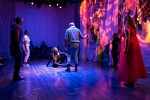Gods and goddesses will rule over destruction and chaos from campus this week.
An event titled “An Evening of Devised Works,” running Thursday through Saturday in Melnitz Hall, will catalogue their actions. The event’s single play, titled “A Creation Myth,” is the result of Cohort 6 – a group of graduate acting students – partnering with graduate directing student Mark Vallejo and graduate playwriting student Ryan Stevens. The play focuses on gods in charge of concepts like order and connection, who deal with the crumbling of systems in humans’ lives, such as love, culture and identity. Graduate acting student David Kepner, who plays the god Desmos, said he hopes students are drawn toward the play because of the universality of its themes.
“Because each character in the play has an identity and what they stand for, it’s also like an identity crisis,” Kepner said. “What do you do when you don’t know what to do? How does that crumble you, or (how do you) grow from it? It’s extremely universal.”
[RELATED: Group’s play examines different perspectives of conflict by involving audience]
Because of the program’s interdisciplinary structure, the actors in Cohort 6 also helped write and direct the play, said graduate acting student Taji Senior, who plays the Egyptian goddess of order, Ma’at. The students took directing and acting classes throughout the year that helped them prepare for the production, Senior said. They also took a class specifically focused on devised works – pieces of theater that emerge collaboratively in response to a certain stimulus. These classes, Senior said, allowed them ample time to come together to discuss the play at large, focusing on character and plot development.
Multiple students contributing to the writing and directing of the play was beneficial in some ways, Kepner said. The ability to go into a scene with acting in mind helped ease the process of writing scenes, Senior said. However, the interdisciplinary nature also presented difficulties in terms of deciding which ideas to cut as well as how much stage time each character receives, Kepner said. The actors also want to keep the audience engaged as they deal with lofty concepts such as chaos and identity, which can easily just become people talking about concepts, he said.
“Today’s stories are hero-villain centric, … often focused (on one person),” Kepner said. “How do we change that formula, and how do we make it interesting?”
When deciding on the play’s subject, the students shared personal stories that mattered to them, and from there, they chose the themes they felt they could incorporate into their play, Senior said. An example is how Kepner had family members go to jail and how the system of incarceration changed his relationship with them. With Kepner’s god Desmos symbolizing connection or bonding, he was able to explore some of those themes personal to him, he said.
These characters, who represent aspects of the natural world as well as human life, were self-selected by each of the actors. The actors brought in research to every class session to figure out how each different character fit into the themes of the play, Senior said. While Senior’s character was inspired by the Egyptian religion, the name of Kepner’s fictitious god came from the Greek language.
Not all aspects of their individual interests made it into “A Creation Myth,” but they showed up in other ways – such as graduate acting student Kendale Winbush’s story. His original interest was in bees and how human activity affects bees’ lives. Bees are not in the story, but the themes of Earth and destruction are, so some of his ideas blended in when the play explores how people deal with the fallout of chaos, he said.
“(Those) characters never made it into the play, but another central theme is Earth and destruction,” Winbush said. “In a light way, the beekeeper is still in the play.”
[RELATED: Film showcasing Chinese culture features graduate students in cast and crew]
Since the themes were chosen because everyone in the group had an ability to speak about them, they are universal, Kepner said. One universal theme deals with how people approach the notion of identity, Senior said, because the play deals with how we act within socially constructed rules of society.
“When I was an undergrad, we were talking about identity differently than we talk about it now,” Senior said. “We are all starting to think very critically about identity and about who we are.”
